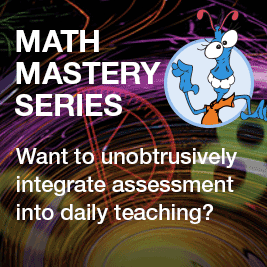Professional Learning
Complimentary professional learning (PL) via Zoom (1.5 hours) is scheduled for midday AEST on Fridays.
To respect privacy, each session is limited to one school or organisation whenever possible. All colleagues are welcome to join in. Alternatively, you may prefer to put together your own group for a session.
The Math Mastery Series (MMS) website provides educators with a wide range of valuable resources and up-to-date information. One particularly useful resource that should be perused prior to the PL is the Professional Learning Reading Plan.
MMS programs are data-driven, and teachers play a crucial role in delivering, diagnosing, and debugging lessons. Students use a workbook to record their data and report issues. This workbook is an integral part of the program. It acts as a GPS, helping teachers target and track student-identified bugs, and helps both teacher and student monitor individual performance.
To fully grasp the role of data in the MMS framework, it is highly recommended PL attendees each have access to a Student Workbook such as myEMMdata.
A regular review of the quality of implementation and the school’s systematic action to improve it will strengthen teacher performance and enhance student achievement. The MMS Implementation Checklist could be used in this regard as it encourages teachers to work together, sharing what teaching behaviours work well, and identifying what behaviours might need refining.
We look forward to hearing from you.

Debugging Lessons
MMS programs are data-driven, and teachers play a crucial role in delivering, diagnosing, and debugging lessons.
Professional Learning via ZOOM
For expressions of interest please contact hello@mathmasteryseries.com.au
or call +61 448 660 696.
APST/AITSL Standard
1.2.2 | Structure teaching programs using research and collegial advice about how students learn. |
2.2.2 | Organise content into coherent, well-sequenced learning and teaching programs. |
2.5.2 | Apply knowledge and understanding of effective teaching strategies to support students’ literacy and numeracy achievement. |
3.2.2 | Plan and implement well-structured learning and teaching programs or lesson sequences that engage students and promote learning. |
3.6.2 | Evaluate personal teaching and learning programs using evidence, including feedback from students and student assessment data, to inform planning. |
4.2.2 | Establish and maintain orderly and workable routines to create an environment where student time is spent on learning tasks. |
5.1.2 | Develop, select and use informal and formal, diagnostic, formative and summative assessment strategies to assess student learning. |
5.2.2 | Provide timely, effective and appropriate feedback to students about their achievement relative to their learning goals. |
5.4.2 | Use student assessment data to analyse and evaluate student understanding of subject/content, identifying interventions and modifying teaching practice. |